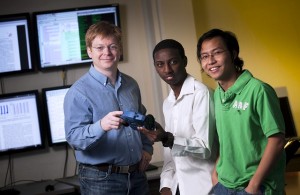Matthew E. Taylor, assistant professor of computer science, has been awarded a CAREER award from the Faculty Early Career Development Program of the National Science Foundation (NSF).

Matthew Taylor, assistant professor of computer science (l-r), Kumera Bekele ’13, and Tong Pham ’13 work on artificial intelligence research in Acopian Engineering Center.
This prestigious and much-coveted award is given, as noted by NSF, in support of junior faculty who exemplify the role of teacher-scholars through outstanding research, excellent education, and the integration of education and research within the context of the mission of their organizations.
Taylor will receive $402,000 from the NSF over five years in support of his research in artificial intelligence. The grant includes travel funding to present his work at national and international conferences.
Students will be involved throughout his research, assisting with developing code, running experiments, and writing papers. This summer, he has physics major Nicholas Escalona ’14 (Shoreline, Wash.) and electrical and computer engineering major Raymond Macharia ’15 (Nairobi, Kenya) working with him in his lab. In addition, Taylor will incorporate material from his research into his classes.
One of the goals of the field of artificial intelligence is to allow computers to learn, either as virtual programs, or as embodied robots, Taylor explains. Although there have been a number of successful applications of such autonomous learning, where an “agent” interacts with its environment to learn to achieve some goal without human intervention, agents traditionally train in isolation.
Taylor aims to build on the Ph.D. research he did while at University of Texas at Austin. There he studied ways in which an agent can share its learned knowledge with another agent, allowing the target agent to learn faster.
He will continue to look at ways in which this “knowledge transfer” can be improved. He will also be investigating how a human can teach an agent and how an agent can teach a human.
“One of the main novelties is that I’m trying to produce a single framework that can cover all three types of teaching: agent to agent, human to agent, and agent to human,” Taylor says.
Advances in the field of artificial intelligence could eventually lead to agents becoming more prevalent and useful in everyday life—in labs, factories, and even in the home.
“As a college professor, I am passionate about teaching. Student learning has been well studied within individual fields, as well as at the pedagogical, psychological, and neurological levels. However, as a computer science researcher, I am also concerned with teaching as it relates to computers,” Taylor wrote in his NSF grant proposal. “Human teachers and human students are well studied, but we have few, if any, guidelines about how to best teach, and learn from, agents.” His research will look for ways to fill this knowledge gap.
Among the experiments Taylor will be working on are having an agent learn to play a real-time strategy game, in which it learns to control different units, learn from other computer players, and learn from and teach a human player.
In another experiment, a computer will learn to fly a quadcopter through a complex course, learning either from independent practice or from a human. Then it will transfer its knowledge to an octocopter (a type of helicopter with eight rotors), which will allow the octocopter to learn to fly more quickly than if it had to learn from scratch.
Taylor will also be developing stand-alone modules that can be used to teach artificial intelligence at other schools, based in part on this research.
Taylor is the second member of Lafayette’s faculty to earn the CAREER award award. Anne Raich, associate professor of civil engineering, received one while at Texas A&M.

2 Comments
Matt,
This is my second attempt. I’m unclear whether the first one went through.
Congratulations on receiving the NSF award.
Cathy and I celebrate your success.
Paul
Comments are closed.